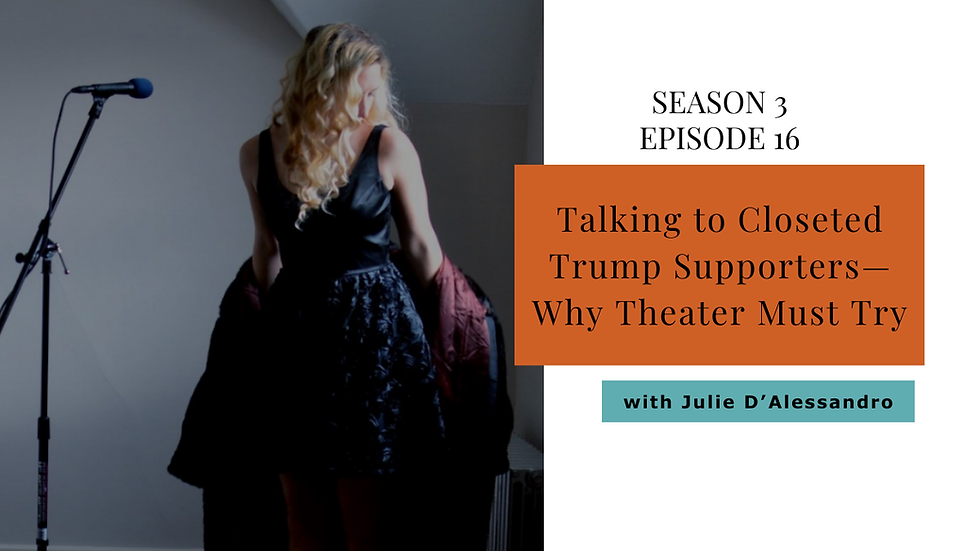What Are Trauma-Informed Creative Spaces? with Dr. Jackman
- Kira Troilo

- May 27
- 3 min read

Dr. Charmain Jackman knows what it takes to create safer, healthier spaces in the arts—because she’s been doing it for years.
As one-third of the Inclusive STAGES team, Dr. Jackman brings her trauma-informed lens to where artists need it most: inside rehearsal rooms, during emotionally intense productions, and at the leadership table. She’s a person theater companies call when something feels too heavy, too complicated, or too human to ignore.
She’s the psychologist who helps actors step out of traumatic roles without carrying the weight home. She guides teams through difficult conversations and moments of rupture. She also teaches organizations how to build psychologically safe practices that often last without a big budget.
In this conversation, Dr. Jackman shares the exact tools she uses in professional theater settings and through our Inclusive STAGES program. These aren’t just theories. They’re real, actionable methods you can start using tomorrow to protect your artists, strengthen your process, and deepen your inclusion work.
Please note that this episode mentions sexual assault and suicide, which may be sensitive for some listeners.
Here's what we cover:
Why the “show must go on” mindset does more harm than good—and what to replace it with
A simple but powerful “deroling” practice that helps actors safely separate from intense roles
How historical and generational trauma shapes Black artists’ access to therapy—and how leaders can show up better
The reason only 3% of psychologists in the U.S. are Black, and what that means for representation in your rehearsal room
How to use Dr. Jackman’s Psychological Safety Checklist to build healthier, more inclusive environments
The difference between art therapy and therapy for artists—and why that distinction matters
What culturally competent care really looks like, and why it’s critical in predominantly white theater spaces
Ready to make your rehearsal rooms safer, your teams stronger, and your art more honest?
This episode is your blueprint.
Dr. Jackman’s work reminds us that caring for artists isn’t just the right thing to do—it’s what leads to better art.
When we create spaces where people feel safe enough to be vulnerable, the work doesn’t suffer—it deepens.
So ask yourself: What might change in your theater if every artist felt truly supported, respected, and seen?
Let’s build that kind of space…together.
About Dr. Charmain Jackman
Dr. Jackman is an award-winning psychologist, author, TEDx speaker, and founder of InnoPsych, an organization committed to making mental health support more accessible and inclusive. Through her lived experience with burnout, racial stress, and entrepreneurship, she helps individuals and institutions create sustainable well-being practices rooted in joy, mindfulness, and equity. She’s been featured in Oprah Daily, NPR, The New York Times, and more, and was honored as Boston’s Black History Month Innovator of the Year in 2021.

Related Episodes
Links & Mentioned Resources
Watch Dr. Jackman’s TED talk
Connect with Dr. Charmain Jackman:
Connect with Kira:
Thanks for joining me on this episode of Inclusive Stages! If you enjoyed this episode, please leave a review on Apple or Spotify to help me reach even more theater makers, theater artists, and theater lovers who want to make our industry a better place for everyone.
Thanks to our music composer, Zachary McConnell, and our producer, Leah Bryant.
More about the Inclusive Stages Podcast
Welcome to 'Inclusive Stages' -- the go-to weekly podcast for theater makers, theater artists, and theater lovers who want to make our industry a better place for everyone. We'll chat with actors, directors, designers, scholars, and more about the current landscape of the theater scene and get their thoughts on how we can do better.
Host Kira Troilo will also give you a sneak peek into live EDI coaching sessions and offer actionable tips for creating more equitable, inclusive, and empathetic theater spaces that support and value the diversity of artists and audiences. Join the conversation, and let's collectively shape the future of human-first theater, one stage at a time.
.png)



Comments